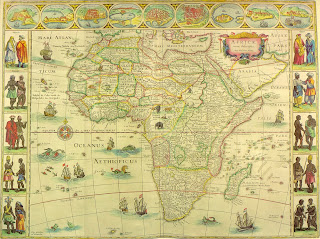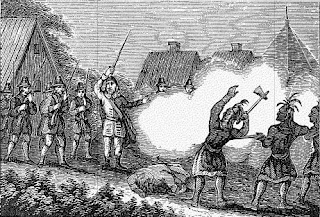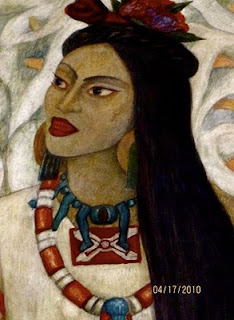Calligraphy Under the Cover of Night Of God you ask me? Oh jaan I thought you knew by now. Anarchy begins in the loins they say: I clamp palms in an unholy embrace with men sculpted from shattered mirrors and torn sheets of music. If gluttony is sin, then I guess I am going to Hell because I am shrouded by their veils of rolled back eyes, taut skin, and twisted fingers I have written psalms to the waves of his breath with my smeared mascara if God is your verse, then I sink into skin. Would you still want me then? You scribed psalms in the neon ink of mascara, a mascara of infinite sand his wavy breath trod upon, sand that like chamber music flows out of my hand, this room, and symphonic coronation. Or did you trace into the sand? The poetry of anarchy begins in the flower, some miles away from the beach. Flower: that intersection of lines, that could be you or me infinite variations on geometry called adam, hebrew for man, first man, add an ah of surprise for earth, dirt, almost dust before springtime, adama, be my knife and peel for monosyllabic blood dam, dom is silence, and when we stand still for the dead. Etymology’s poem forgot Eve in the beginning, left to evolutionary silence, until this eve: pick a nocturnal flower. Forgive me but a jungle bear is in no need of holy words folded into יברעמה לתוכה I watch you on your knees pilgrimage to an oasis called Jerusalem whispers whispers I watch your childhood bent over your Abba’s withering books. Fingers trace stories of people who read grains of sand and could tell you where to look for water. I could never draw your words in sand but I beg for answers instead: where are those verdant lands your God promised you? How could you believe when I am here sitting in dried weeds and burnt out cigarettes waiting for the words I love you to tumble from his lips didn’t your God create the world in six days? Six days: the days of a woman’s cycle my lips are sealed as I dream iron red dreams blood damned between thighs I have found your nocturnal flower tucked in the folds of my sister’s blanket. Tia Eva, yo llora para usted. Six days. And on the seventh he dreamed, if a god can dream: be buried under laughter and colors he’d never imagined. If gods can imagine. On the first day a grain of sand created God, who looked in the mirror—a grain of sand— and created all the other grains of sand. On the second day a grain of sand created God, who looked in the mirror—glass rubbed from sand— and created all the other grains of sand. On the third day... You ask where is the milk and honey, and the twinkle in my eye when I catch a springtime orchard, under quivering, revolutionary colors of peels? Arched within a sandy wind, somewhere, perhaps still in Egypt. Will you spend your afternoons pacing the Sahara in pursuit of Paradise? Wedding The anatomy of Paradise will reveal itself in echoes as passing thunders chart gods, the valley rewords the tambourines of women on their way, and women passing under the clean cloth of sky, corners upheld by four erect spines, from which flutter outward the white pages. woman veiled, man sings woman unveiled, shattered glass ribs reveal black ink below, adventurous. (and all that comes after) Now a window sees a garden, on the sill whistle outward pale pages called dove. ink nears, dove rises to the roof: the house a voice box in soprano. | |
Monday, February 28, 2011
Calligraphy Under the Cover of Night: Conversations
Sunday, February 27, 2011
THe Post-Colonial Dilemma: Introduction



Saturday, February 26, 2011
SSA INDIANS
 I will forever be indebted with my high school. I have learned so much. It has made me who I am. Tell me which school lets a high school senior travel the world and not attend classes to understand what it means to be empowered as a woman? India, Spain, and Chiapas would have been a mere dream. Especially Chiapas. I was able to be a rebel with a cause and come to terms that it is perfectly fine to be agitated. But in a school in which I was able to explore post-colonial issues at my leisure in the library between classes, our institution was shrouded in the image of the INDIAN. Shady Side has a strong sports tradition. The symbol of the Indian is coveted, but during my junior year, the forum was opened so that students could voice their opinion on the Indian. This is what they said:
I will forever be indebted with my high school. I have learned so much. It has made me who I am. Tell me which school lets a high school senior travel the world and not attend classes to understand what it means to be empowered as a woman? India, Spain, and Chiapas would have been a mere dream. Especially Chiapas. I was able to be a rebel with a cause and come to terms that it is perfectly fine to be agitated. But in a school in which I was able to explore post-colonial issues at my leisure in the library between classes, our institution was shrouded in the image of the INDIAN. Shady Side has a strong sports tradition. The symbol of the Indian is coveted, but during my junior year, the forum was opened so that students could voice their opinion on the Indian. This is what they said: PRO INDIAN MASCOT:
-We are paying tribute to Native people all over the United States. We re acknowledging their bravery and strength. They are commendable, strong people. We value them. That is why they are our mascot.
-it is a shady side tradition. We should not change it if it never was a concern. we have such pride in the symbol. it isnt Indian. Its Shady Side.
 This is what I Think as well as other students:
This is what I Think as well as other students:-For several years, the United States had genocide over genocide, exterminating and moving indigenous families around America. Native populations have been reduced to small numbers. In fact, Native peoples are not one people. They are several people. They are nations with different languages and dances and movements and religions. In the late 20th century, Native people united to reconstruct an identity that was a reaction to the years of colonialism of Native tribes. A Sioux Indian has very little in common with an Iroquois Indian or a Cherokee Indian yet they are lumped together. The mascot does not allow for any acknowledgement of the sovereignty of different Indian nations/tribes. Also, when schools has the INDIAN as the mascot, the symbol is always a Native Indian in Great Plains garb. It gives the illusion that all natives are the same and their culture is marked by long feathered head dresses and fringed suits. It is an incorrect description.
-The mascot does not really pay tribute to the Indian. It is a mockery to the Indian. Other teams in the leagues are wild cats and predatory fish such as the sharks. Placing a people in that category makes the Native look as though the group is part of the flora and fauna. It makes them sound as though they are wild and primitive and animalistic.
-We should be looking at a historical perspective. We should keep in mind history and compare and contrast to today. There are Native Americans around today. They do not look like the romantic image that is splayed across Shady Side banners. There is sorrow but hope in the reservations. There is a history of deceit. The image of the Indian on athletic ware gives the illusion that A. A native population is dead and we are honoring their ghosts. and B. that those who are in reservations are not "true" indians because they are not wearing headdresses. We have painted images as to what Native people are supposed to be like and those who do not fit those images are illegitimate.
-I understand that this is a tradition but keep in mind that traditions can change. We are constantly evolving. We acknowledge that we should not discriminate because of race, socio-economic status, gender, age, ethnicity, or sexual orientation yet we have a Native American mascot? Something is not consistent hear but we can learn. And it is a concern because we are bringing up. Students voiced these concerns. People do care. That is why the discussion continues. The mascot is a mockery to indigenous people.
Does this look appropriate?
Contrast this video to a traditional pow-wow. See the difference? No war paint in the second video.
I hope we could change the mascot in my school. It is disappointing to see that the administration is not really taking strides to change the mascot. Their fear is the loss of funding. But I think we need to take that hit to illustrate that our school is conscious about social issues and is sensitive to issues. This is a battle for Native people because it is a small step of acceptance and acknowledgement for indigenous rights and legitimacy. I hope for the best.
Sunday, February 20, 2011
Why India Won't Be Having a Revolution Soon... Bollywood.


Monday, February 14, 2011
MARS INC. and DEVELOPMENT

 But there are great steps the organization is making. For example Mars Inc. is working with the Rainforest Alliance to certify chocolate as sustainable. More yields mean less chance of disease in the plants. Also the chocolate is sustainable if the farmers are not cutting any more trees. What guarantees that the farmers are not clearing any more land for private property. But as I have read it it does not really ensure that new farmers will stop cutting down trees. The sutainable label is applicable for farmers right now who have 3 hectors of land on average each. But what if more people want to farm because it is a lucrative business? Its a label for individual farmers but does not concern how rapid the agribusiness is growing. Nevertheless, its a good step and brings awarness to these issues. Hopefully the industry will keep redrafting its policies.
But there are great steps the organization is making. For example Mars Inc. is working with the Rainforest Alliance to certify chocolate as sustainable. More yields mean less chance of disease in the plants. Also the chocolate is sustainable if the farmers are not cutting any more trees. What guarantees that the farmers are not clearing any more land for private property. But as I have read it it does not really ensure that new farmers will stop cutting down trees. The sutainable label is applicable for farmers right now who have 3 hectors of land on average each. But what if more people want to farm because it is a lucrative business? Its a label for individual farmers but does not concern how rapid the agribusiness is growing. Nevertheless, its a good step and brings awarness to these issues. Hopefully the industry will keep redrafting its policies.Saturday, February 12, 2011
Was Machiavelli Right?
 The feast of Thanksgiving is not your happy Hallmark card. It is a story of betrayal, of bloodshed. So what is the real story? Why does it matter? What does it mean in the realms of IR theory? Well when the Pilgrims first came to the "New World", after the first winter, 1/2 of their population passed away. 50 people are so remained. The Wampanoag people who lived in the area saw how the pilgrims were interacting. They realized that the pilgrims were not so much of a threat. Why? Because they were dying off, were starving, and had brought along women in children. From a cross cultural perspective, the natives believed women and children should not be involved in warfare. It was exogenous to their customs so they did not see the immigrants as malicious. Massasoy, the tribal leader of the Wompanoag believed that they should make an alliance with the pilgrims because they saw how strong their weaponry was. Massasoy was afraid that other tribes in the Massachusetts area would harm his tribe because of the dwindling numbers of Wompanoag in the region due to an epidemic. He needed support. He was able to make a strong alliance with the pilgrims. They were in need. A treaty was negociated in which the English settlers would protect Massasoy's tribe while the Wampanoag must teach the colony how to farm and live off the land. The alliance was strong and peaceful. Massasoy and his tribe were under the protection of the English and the English learned the skills of the land. There was a mutual respect and gratification. They began to adapt each others way of living to their own. Indian language, furs, and cooking methods were used by the Pilgrims while the Wampanoag had guns and steel for daggers.
The feast of Thanksgiving is not your happy Hallmark card. It is a story of betrayal, of bloodshed. So what is the real story? Why does it matter? What does it mean in the realms of IR theory? Well when the Pilgrims first came to the "New World", after the first winter, 1/2 of their population passed away. 50 people are so remained. The Wampanoag people who lived in the area saw how the pilgrims were interacting. They realized that the pilgrims were not so much of a threat. Why? Because they were dying off, were starving, and had brought along women in children. From a cross cultural perspective, the natives believed women and children should not be involved in warfare. It was exogenous to their customs so they did not see the immigrants as malicious. Massasoy, the tribal leader of the Wompanoag believed that they should make an alliance with the pilgrims because they saw how strong their weaponry was. Massasoy was afraid that other tribes in the Massachusetts area would harm his tribe because of the dwindling numbers of Wompanoag in the region due to an epidemic. He needed support. He was able to make a strong alliance with the pilgrims. They were in need. A treaty was negociated in which the English settlers would protect Massasoy's tribe while the Wampanoag must teach the colony how to farm and live off the land. The alliance was strong and peaceful. Massasoy and his tribe were under the protection of the English and the English learned the skills of the land. There was a mutual respect and gratification. They began to adapt each others way of living to their own. Indian language, furs, and cooking methods were used by the Pilgrims while the Wampanoag had guns and steel for daggers.
Sin Bullshit: History From the Ground Up
 As a student, I read texts. I read books that have been written often with one voice. Often one prespective. Imagine our elementary school days when we read about the great Indians who roamed the plains. Did they ever mention the gangs in Lakota reservations in which frustrated youth beat each other up for sport? How how about the environmental degradation occurring on land that is supposed to protecting by the US government for Native Communities. How is this not taught? Why are we not speaking of genocide when we acknowledge the American past? Language is so very important. According to the Sapir-Whorf hypothesis, our language affects our perceptions. If we do not utilize the rhetoric and say what our history really is, we will never be able to understand what happened in this country 100-200 years ago. We will not understand that slavery was the pulling of people, forced diaspora of other people. If we do not use the proper language, we will continue to behave unjustly as a society and force diasporas on individuals because we have not learned from our mistakes.
As a student, I read texts. I read books that have been written often with one voice. Often one prespective. Imagine our elementary school days when we read about the great Indians who roamed the plains. Did they ever mention the gangs in Lakota reservations in which frustrated youth beat each other up for sport? How how about the environmental degradation occurring on land that is supposed to protecting by the US government for Native Communities. How is this not taught? Why are we not speaking of genocide when we acknowledge the American past? Language is so very important. According to the Sapir-Whorf hypothesis, our language affects our perceptions. If we do not utilize the rhetoric and say what our history really is, we will never be able to understand what happened in this country 100-200 years ago. We will not understand that slavery was the pulling of people, forced diaspora of other people. If we do not use the proper language, we will continue to behave unjustly as a society and force diasporas on individuals because we have not learned from our mistakes.Thursday, February 10, 2011
Preface: Nastolgia. Where do I go?
Growing up, I loved visiting the museum. Especially the Native American I was fascinated by the embroidered cloth that draped the great warrior. His sculpted face drew me into his powerful warrior eyes. But I could never find his flesh twin. Where are the Indians? I could never find these 'noble savages' walking among us. I connected the dots while reading about the genocide that occured 100-200 years ago. The fact we do not use this terminology illustrates that people do not really understand what has happened. They just... dissapeared. Convinient for history. Why are they featured in the NATURAL history museum. It gives me the impression that Native nations were once a part of the flora and fauna of the land. As is they are as fascinating and curious as the very buffolo the Sioux hunted. Also, if we are talking about this history of a people, why then aren't there exhibitions about German Americans who came to this country due to diaspora and their integration? Why not the farming techniques of the Dutch who tilled American land? Why not the history of people who have made America? Why the savage in the headress in every museum?
The Native communities today do not have members strutting around in headresses all day. There are Native Americans. They are not the the romantic images of our past. I wonder if they really were. In a book I am reading called EVERYTHING YOU KNOW ABOUT THE INDIAN IS WRONG by Paul Chaat Smith, Smith comes to this conclusion:
Indians have been erased from the master of narrative and repleaced by the cartoon images that all of us know and most of believe. At different times the narrative has said we didn't exist and the land was empty; then it was mostely empty and populated by fearsome savages; then populated by noble savages who couldn't get with the progra; and on and on. Today the equation is Indian = spiritualism and environmentalism. In 20 years it will be something else. It is everything but it does not make us fully human (20).
This quote confuses me because I sometimes romantically describe Chiapas, full of nastolgia. I hope more than anything that I describe them with respect. I want more than anything to connect with a displaced people because it must be done. Why? We are human. This is our story. All I know is that I am frustrated with the constant cheating and lying from the administration of Indian Affairs and the history of theft. Justice must be served. I do not know how. Tribes desire sovereignty. Can the United States provide the Lakota sovereignty over the area of Montana, North and South Dakota, Nebraska and Wyoming? Probably not. But something must come. There must be change. Why? Because what is happening not just. I am frustrated about the situation and I want to come to more closure about the issue. How? Well, I think like this: the more we study the symbols in our daily rituals, the more we dig into anthropology. The more we dig into anthropology, the more we can understand humanity. The more we understand humanity, the more we can understand the relations that build this world, tame this world, and set fire to this world. Maybe. That is why I study. To understand. This is the beginning. I hope. Maybe I am being to Panglossian: thinking that I can come to terms with this struggle. But how would I know if I do not try. And so I begin this journey to come to terms with what it means to be marginalized and the allegory of the 'noble savage'.
Tuesday, February 8, 2011
Voy Caminando: And I keep Walking
 And this is where we come to La Malinche.
And this is where we come to La Malinche.Why is it that every tableau of the native female describes a woman who is her so called ambassador for her people. It is not just some professional diplomatic self to her people. She also does it because of love. And when I say love, I mean lust. She is entrapped or she entraps him the blankito and releases her secrets of her people. Is she the global nomad? Is it about self interest? I mean power struggle is constant. So do we try to win in a hopeless situation? Is that the global nomad? Well in my opinion, the global nomad is an attitude that would not just be one person in society. The reason La Malinche is held to this standard of "betrayer" is because she understood the fluidity of bounderies. Her love and sex life became public for future generations forever because of the diplomatic position she had among her people. She was a global nomad because she was neither tied to her Aztec people of Spanairds. Regardless of what people tell you. Why else would she have acted in those ways? She did not answer to one world power over the other at the end of the day. I think we should all be like La Malinche. We should be global nomads. What is a sovereignty? IR theories of realism and liberalism often leave out a major structure of sovereignty: CULTURE. Why is it that the Zapatistas wanted their own region? They shared a "struggle" and mode of living. If we can understand the fluidity of culture, we can understand the imagined communities that are nations. Too much national pride adds to even more convolusion.
When it comes to me, I consider myself a global nomad because I have been raised by my Indian nationalist parents on US soil and became a woman in Mexico. I have no place to call home. And I am happy with that because I realize that I will have an open mind. I will be able to walk through doors and look behind only to dream of memories but I will not be too sad over the loss of a "home country". I use the system. I have an American passport. I have American opportunities and rights. But do I really have a burning love for this nation? No. I guess I am your La Malinche. Using your nation so that I can keep walking.
La Malinche: The Mother of Crucified Woman

In Chavela Vargas' song La Llorona, she sings "yo soy como el chili verde, llorona, picante, pero sabroso"
I am like a green chilli: spicy, but delicious.
I think this is the mantra of La Malinche and every intelligent woman who is in the midst of duty and pleasure.
What fascinates me is representation of these women. She is both the mother and the raped or the chingona. She was violated. Some people say that La Llorona did not have a choice in the matter. She was weak. The name La Llorona signifies this sentiment. But at the same time, she is strong, she is the suductress. Those lips, those eyes, the fiercity in her tongue. She is the mother of a bastardized land. Did she abandon her people? Was she selfish? To me, La Malinche will not be one or the other: weak or whorish. She is strength to me. Strong women find themselves fighthing themselves at the end. They are glorified for their intelligence and prized for their beauty like a jewel. But they are judged as possession. That is the mistake. They are not treated as women. If they refuse a man, she is a harlot. If she sleeps with him, she is a harlot. This is the ascribed identity of a La Malinche. And trust me, there are several of these mujeres walking amogst us: Cleopatra, Frida, Ms. Monroe, our mothers, even you.
But what we need to realize is that these women were women. Not gods. Not monsters. Women. They were full of life. Full of determination, love, lust, youth. Women who defy the norm are automatically categorized. But we are not weak. We are not La Llorona. We are La Malinche. Women of our own destiny. Choices we make are not for any man. In my mind, La Malinche, although lost her name, stole Cortes'. She became the face as he became the raper. I am not glorifiying La Malinche. I am paying homage. To me, La Malinche is not just a mother or a weeper. She is strength. She is intelligence. She had a duty to herself and no civilization and no man. How dare empire after empire puts her on trial. Trials in which men stand up and point the finger at a woman with hair thicker then huipiles. As my mother always says men will always point fingers, but it is up to us to hang our heads in shame or hold our backs tall and take the arrow with pride. But must we lose at the end? Have we? Have we coquetas lost everything? No. We are the winners at the end of the day. We live in songs, poetry, cantina songs in bars tucked in verdant Chiapaneca hills. That is where we live. We live between heaven and hell. We are Las Malinches de La Tierra. The Malinches of the Earth.

